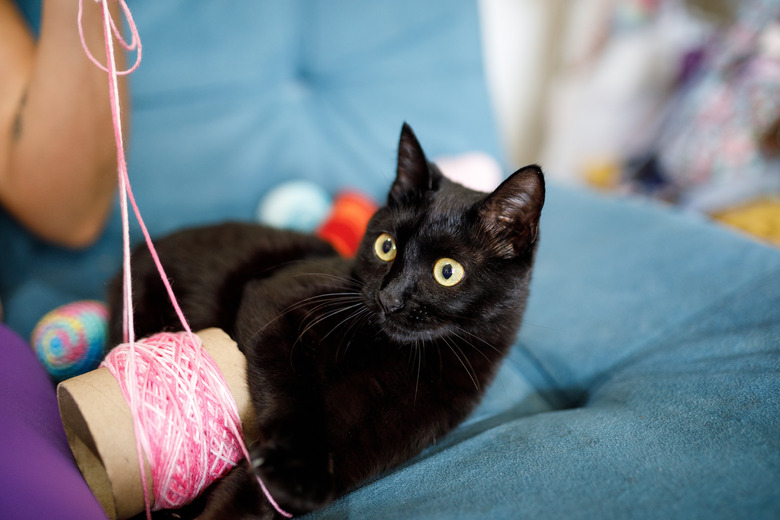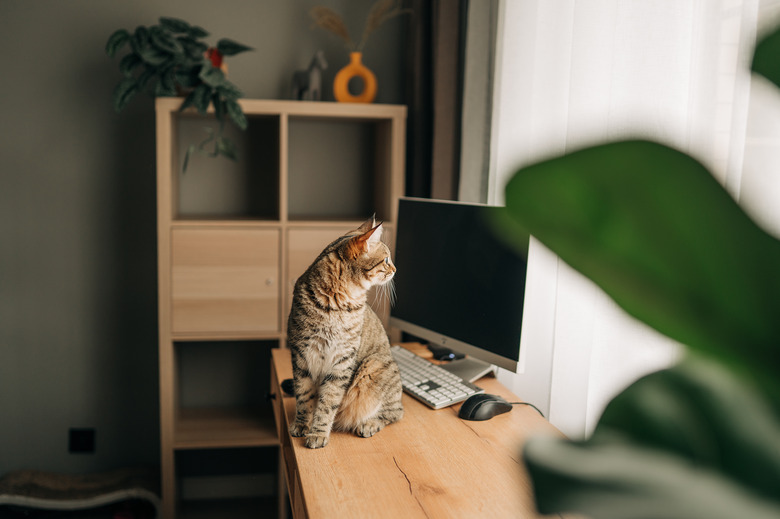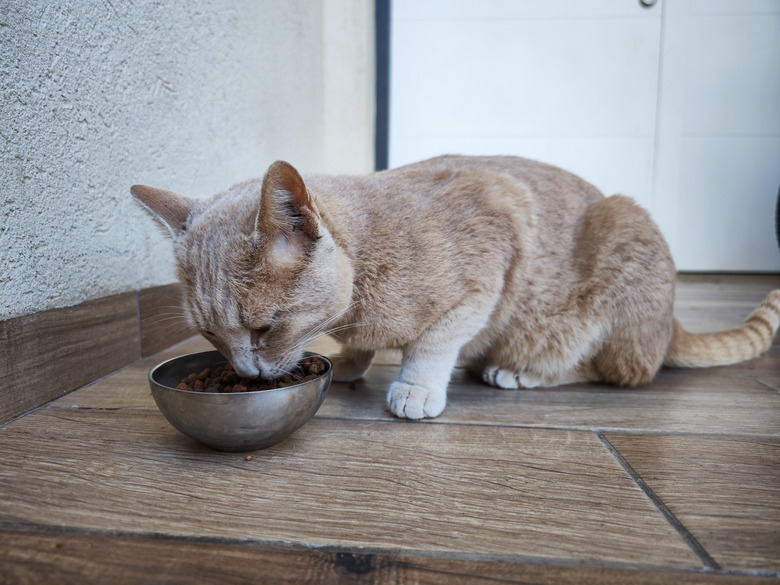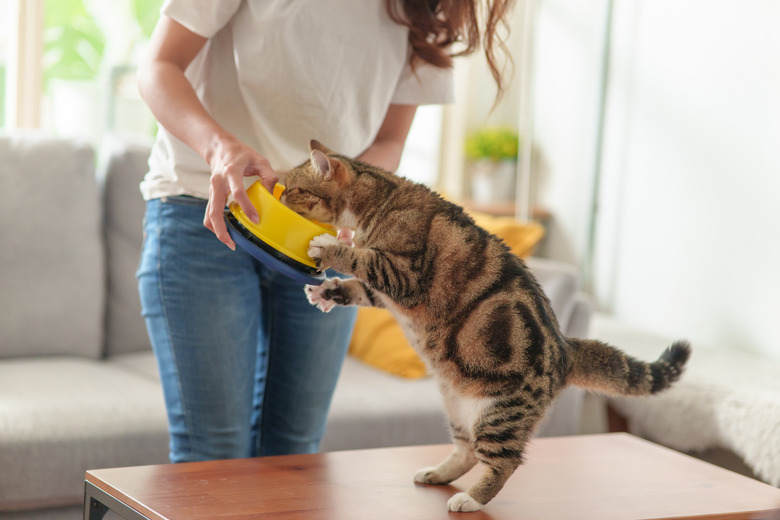Gas In Cats: Signs, Causes And Treatment
Every so often, you may notice that your cat is slightly gassy. It is normal for cats to pass wind once in a while. If your cat has a sudden onset of gas or has frequent or excessive flatulence, it is a good idea to consult your veterinarian. Gas in cats can be a sign of illness, especially if it is accompanied by other symptoms, such as bloating or stomach pain.
Do cats fart?
Do cats fart?
Yes, cats do fart. The production of gas is a normal part of the digestive process. When the stomach expands with gas or air during digestion, it is eventually released from the body via the rectum.
Signs of gas in cats
Signs of gas in cats
When most cats pass gas, it is quiet, and there is no smell, so pet owners do not even realize it is happening. Some cats may occasionally have noisy or smelly farts, but this should not occur with any regularity in a healthy cat. Cats also very occasionally burp. As with passing wind, you should speak to your veterinarian if they do so often.
You should consult your veterinarian if your cat has any of these symptoms or digestive issues along with flatulence:
- Extremely smelly flatulence
- Discomfort and bloating of the belly
- Grumpiness and lethargy
- Borborygmus, or tummy rumbles
- Diarrhea
- Vomiting
- Bloody stool in their litter box
- Loss of appetite
- Not drinking
- Trouble defecating
- Drooling
Causes of cat gas
Causes of cat gas
There are many causes of gas in cats. Some require lifestyle or diet adjustments, but others are more serious and may require a veterinary consultation and diagnostic tests. Always consult your veterinarian if your cat has excessive gas and is passing wind with increasing frequency.
- Change of cat's diet: Cats are very sensitive to diet changes. Starting a new food too quickly or adding something new to their diet can cause gas. Even a new bag of their regular cat food can trigger a bout of flatulence. If your cat goes outside, they may scavenge and eat spoiled food that causes an upset tummy.
- Overeating or eating too quickly: Some cats gulp down their food and accumulate swallowed air when they do so, which may come out as a fart. Cats also very occasionally burp for the same reason.
- Food allergies or intolerances: Food intolerances in cats can come on at any age and may even occur with foods the cat had no problem with previously.
- Malabsorption or maldigestion disorders: These occur when a cat has difficulty digesting or absorbing nutrients in food.
- Intestinal parasites: Worms such as roundworms or hookworms are a common cause of cat flatulence. Tapeworms, which cats pick up from fleas, are another.
- Bacterial or viral infections: Infections in the gut can cause gas as well as other gastrointestinal symptoms.
- Inflammatory bowel disease: This can result in chronic irritation of the intestinal tract, resulting in excessive wind.
- Microbial imbalances: These can be caused by scavenging or by certain medications.
- Gastrointestinal obstruction or constipation: Gas buildup and discomfort will occur if a cat cannot pass bowel movements. Occasionally, hairballs can cause a GI obstruction.
- Cancer: Flatulence, loss of appetite, and borborygmus can be signs of cancer in cats.
Treatment for gas in cats
Treatment for gas in cats
If your cat has gas, consult your veterinarian. They will physically examine your cat and may wish to conduct tests. These can include fecal and blood tests, urinalysis, and X-rays. It will assist your veterinarian in diagnosing the problem if you can provide details about the onset of the flatulence and its frequency. Information about recent diet changes and information about any other symptoms your cat is displaying will also be of great help. Identifying what's affecting your cat's digestive system will ensure that your pet receives the most appropriate treatment.
Dietary trials
If your veterinarian believes that your cat has a food intolerance, they may suggest that you undertake food trials to identify sensitivities. They may also put your cat on a diet with fewer carbohydrates, as these can often contribute to flatulence in cats.
Probiotic or prebiotic supplements
Your veterinarian may wish to give probiotic or prebiotic supplements to your cat to help restore gut health and the correct microbial balance.
Deworming
Worms may be the cause of your cat's gas problem. In this case, your veterinarian will give your cat suitable deworming medication and provide you with a deworming schedule.
Antibiotics
If your cat has a bacterial gut infection, your veterinarian will identify the most suitable antibiotic.
Vitamin B12 injections
Your veterinarian may give your cat B12 injections to treat malabsorption problems causing excessive wind.
Steroids
Cats diagnosed with inflammatory bowel disease may be prescribed steroids.
Surgery
In the case of an obstruction, surgery may be necessary. A condition called megacolon can result in severe constipation, requiring surgery. This occurs when the colon is stretched, allowing fecal matter to accumulate.
Simethicone
Simethicone is an over-the-counter anti-gas medication. It has not been well studied in cats. While it may be recommended by your veterinarian off-label for short-term relief, it should never be given to cats unless they are under veterinary supervision.
How to prevent flatulence in cats
How to prevent flatulence in cats
If your cat only suffers from mild gas, you may wish to try changing their diet or slowing down their eating. See your veterinarian immediately if your cat has other symptoms, such as vomiting, diarrhea, or weight loss along with flatulence.
Change your cat's diet
If you do change your cat's diet, there are important points to consider so that your cat benefits from the change.
- Switch your cat to a high-protein diet: If your cat has no worrying symptoms except some gas, you can try gradually switching them to a better-quality, higher-protein diet. Cats are obligate carnivores and may have difficulty digesting dairy products, grains, legumes, or vegetables.
- Prevent your cat from scavenging: Do not allow your cat access to trash or spoiled food. This can make a cat sick and can lead to long-term health problems.
- Stop feeding your cat table scraps: Do not supplement your cat's diet with human food leftovers, as the dietary change may upset your cat's stomach.
- Consider canned wet food: If your cat does not consume enough water, dry kibble can cause gastrointestinal problems. It can also lead to kidney and urinary tract disorders.
Only change your cat's diet very gradually, adding a little bit more of the new diet to each meal over a period of two weeks. Suddenly changing your cat's diet may lead to further tummy problems. If your cat's gas does not improve quickly after the change in diet, consult your veterinarian.
If your cat loses their appetite, take them to the veterinarian immediately. Even a couple of days of eating less than usual can result in hepatic lipidosis, a life-threatening condition.
If your cat eats too fast
Some cats gulp their food. Cats eating too much or too quickly may suffer from a medical condition, such as hyperthyroidism. Always mention your cat's eating habits to your veterinarian if they seem unusual.
If your cat just loves to eat, there are ways you can slow down their eating and reduce any associated flatulence.
- Feed your cat little and often: Break up your cat's meals into smaller meals fed throughout the day.
- Feed your cat with interactive cat feeders: There are many cat food puzzles and other interactive feeders for cats that slow down their eating. These are also behaviorally enriching.
- Feed cats separately: If you have a multicat household, feeding them separately will reduce competition and the desire to eat quickly.
- Use slow-feeding bowls for cats: Slow-feeding bowls are designed to make it difficult for cats to gulp down their food.
The bottom line
The bottom line
Cats do experience flatulence as part of their digestive process. Usually, it is not noticeable. When cats have very smelly farts or pass wind excessively, they may be experiencing a gastrointestinal disorder. Dietary changes or intolerances may cause this. If your cat has flatulence accompanied by discomfort, vomiting, diarrhea, a loss of appetite, weight loss, or changes in behavior, seek advice from your DVM, as these can be symptoms of severe illness.



